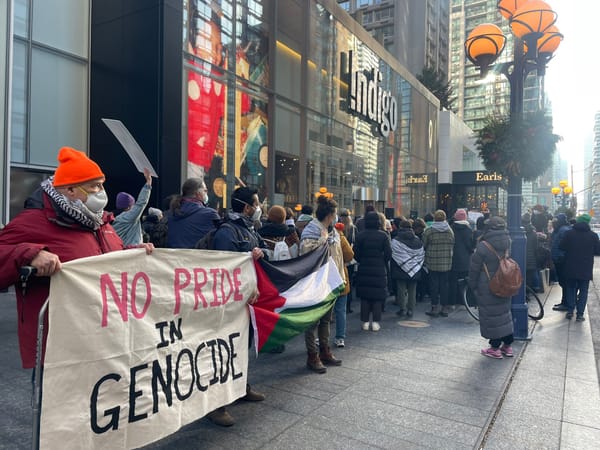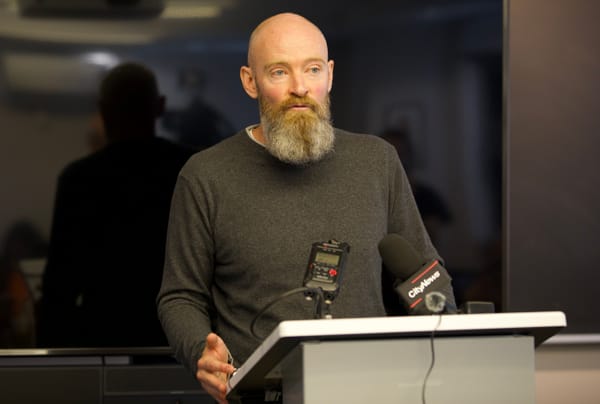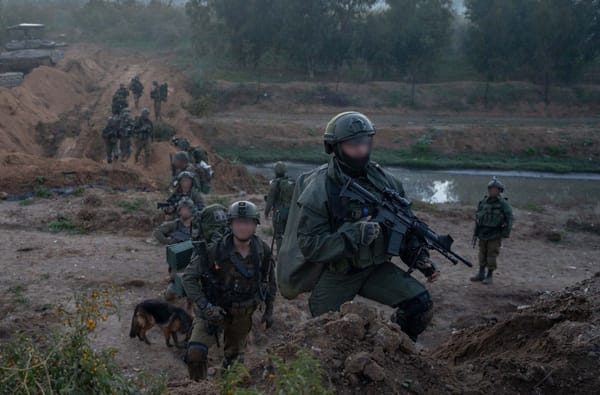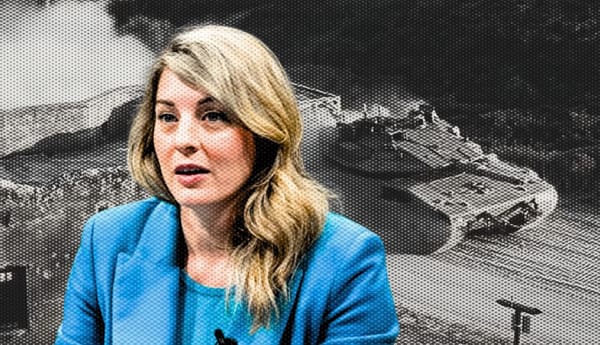On October 26, Premier Doug Ford’s government adopted the International Holocaust Remembrance Alliance’s (IHRA) definition of antisemitism in Ontario through an Order in Council (OIC), becoming the first province in Canada to do so. This came less than 24 hours before Bill 168 — also known as the Combating Antisemitism Act — was set to be discussed through public hearings at the Standing Committee on Justice Policy.
Bill 168, if passed, would have adopted the IHRA definition of antisemitism with the illustrative examples included, seven of 11 of which focus on criticisms of Israel. This would effectively grant the government the power to legally target those who criticize the Israeli state. It’s less clear if the OIC includes these examples or not, as Conservative MPPs have put out contradictory statements on the matter.
Regardless, the OIC has rightfully garnered opposition and anger among Palestinian and Jewish communities, as well as allies doing work on Palestinian human rights, for two main reasons.
First, the IHRA working definition of antisemitism included in the OIC wrongly conflates criticism of Israeli human rights abuses with antisemitism, thereby criminalizing Palestinians and anyone else who dares speak against Israeli apartheid. For example, it considers someone calling Israel a racist state to be antisemitic.
Even Kenneth Stern, the lead drafter of the IHRA definition, said in a 2019 Guardian article that “rightwing Jewish groups” have taken the definition and “decided to weaponize it” against pro-Palestinian advocacy.
Second, the OIC is undemocratic in nature, circumventing the ability of Palestinians and others to voice their concerns as they would have been able to if Bill 168 proceeded.
The OIC will impact many groups, but its chief victims will be Palestinians. In fact, the OIC is just the latest step in a broader authoritarian and racist crack down on Palestinian Canadians.
Anti-Palestinian Racism In Canada
Ontario’s adoption of the IHRA definition isn’t the first act of its kind to target Palestinians, and it certainly won’t be the last. This is due in part to the unique brand of racism we face.
Aside from the interlaced Islamophobic and orientalist bigotry we receive, we’re also often depicted as demographic threats in the West or terrorist sympathizers for simply owning our identity. We’re turned into the ‘other,’ and Zionist groups are allowed to attack us with impunity, and often with the complicity or active support of other institutions in Canada.
This kind of anti-Palestinian racism occurs at all levels. It’s a serious problem in Canadian media, and can sometimes go to absurd lengths. For example, on August 19, CBC The Current’s guest host, Duncan McCue, apologized on-air for merely using the word “Palestine” in an interview the day before. CBC went even further, and deleted the use of the word from the show’s transcript. This is an act of erasure, wiping out our factual history right before our very eyes.
Palestinian student advocacy groups also face a unique set of challenges from the Israeli lobby in Canada. Such was the case last year at York University when pro-Palestine activists protested an event on campus hosting Israeli soldiers. Palestinian activists were met with racist harassment and physical attacks by far-right groups and others, just for exercising the right to peaceful protest. Then, within the next couple days they were falsely portrayed as the aggressors in the media, and demonized by politicians — including Toronto’s mayor, Ontario’s premier, the prime minister and others — who called them antisemitic.
Other forms of Palestinian resistance or self-defence have gotten demonized by politicians in Canada as well. For example, Prime Minister Justin Trudeau has attempted to delegitimize the BDS movement by labelling it as antisemitic. Trudeau’s anti-BDS stance was formalized when parliament passed a motion condemning the movement, allowing Canada to maintain its diplomatic relations with Israel at the expense of Palestinian human rights.
People who have engaged in pro-Palestinian advocacy and scholarship are also targeted on an individual level. For example, you’re probably well aware that the University of Toronto’s law school recently rescinded a job offer to Valentina Azarova, a scholar that had done academic research on illegal Israeli settlements. The dean of the law school is alleged to have done so after being pressured by David Spiro, a Tax Court of Canada judge.
But there are also countless examples of this happening to people that you don’t hear about. Many of these campaigns against Palestinians are incited by Canary Mission, a malicious website that has created a database of hundreds of students, professors and others, labelling them as antisemites in order to inhibit them from engaging in Palestinian advocacy on campuses.
The website destroys reputations and hinders professional careers, and leads to Palestinians getting death threats. The damage done via this digital blacklist is irreparable, especially when law enforcement officials use it as a foundation to interrogate Palestinians during travel or when applying to jobs.
The only way to be removed from the website is by issuing a formal ‘apology,’ which is a further form of dehumanization as many people listed on the website are only there because they struggle for Palestinian human rights.
The OIC’s passing will make all of these things worse for Palestinians in Canada. For example, the IHRA adoption will further impair scholars from engaging in anti-racist and anti-colonial research regarding Israeli apartheid, and infringe on the ability of human rights organizations to document Israel’s abuses.
If the IHRA definition is, or becomes, incorporated into legal proceedings, it will render Palestinians unable to criticize the very state that oppresses us, in another state that is working to censor our existence. If we can’t speak about the violations Israel commits against us as Palestinians, who will?
The Mental Toll On Palestinians
This sort of anti-Palestinian racism, which the OIC strengthens and further legitimizes, also has a deep impact on Palestinians at a personal level, shaping how we engage with society.
Consider that Palestinians are in Canada and want to speak out, but are dissuaded from doing so through the government’s attempts to muzzle us. This means that we’re constantly discussed within Canada, but often unable to take part in that conversation.
Consider that as Palestinian human rights defenders, we have to choose between raising awareness of the plight our people face or protecting our livelihoods, which come under attack if we decide to speak out. This drastically reduces Palestinian engagement in professional spaces, including law, academia and media, because our career hangs by a thread if we do so.
Consider that as Palestinians, our freedom of expression is always hampered because we know that what we say will be met with racist backlash that gets us labelled as antisemites and classified as pariahs. Anyone who speaks out in favour of Palestine will face some level of policing, but Palestinians, and even other non-white people, are targeted in particular. For example, York University law professor Faisal Bhabha — non-Palestinian, but also Muslim and racialized — was targeted by a smear campaign earlier this year for comments he made during a webinar discussing the IHRA definition of antisemitism. Yet as Sheryl Nestel — a white, Jewish person — noted, she wasn’t attacked despite making similar comments on the same webinar.
Consider the impact it has on us as Palestinians that we’re brought up every time antisemitism is discussed, even as white supremacists are vandalizing synagogues and planning and executing mass murders of Jewish people in North America and Europe.
Consider that we’ve been ethnically cleansed and uprooted from our lands, only to be met with a similar authoritarian response in Canada when we protest against the government that was responsible for our mass displacement.
Palestinians are the real victims of so-called cancel culture. From fearing for our immigration status being compromised to being denied jobs, our lives are at stake because we dare to advocate for our humanity. We can’t escape the crackdown on us, whether it’s from the Israeli army in Palestine or at the behest of the Zionist lobby in Canada.
The OIC doesn’t reflect a genuine attempt at fighting antisemitism. Instead, it’s just another effort to stifle Palestinian speech, and a step toward to formally discriminating against us on a provincial scale.







Member discussion